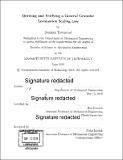Deriving and verifying a general granular locomotion scaling law
Author(s)
Townsend, Stephen (Stephen C.)
DownloadFull printable version (5.228Mb)
Other Contributors
Massachusetts Institute of Technology. Department of Mechanical Engineering.
Advisor
Ken Kamrin.
Terms of use
Metadata
Show full item recordAbstract
The complexities of granular materials make modeling the interactions between grains and solid intruders, such as a wheel, incredible difficult. Often, modeling these interactions requires discrete particle simulation methods, such as the Discrete Element Method (DEM), a process that is prohibitively computationally intensive for large systems. The difficulty of modeling granular materials has posed great difficulty for design engineers, particularly those interested in granular locomotion, since there is no way to gain predictive insight into the performance of a given granular locomotion system. A granular locomotion scaling law was developed, which instructs how to scale size, mass, and driving parameters in order to relate dynamic behaviors of different locomotors in the same granular media. For the development of this scaling relationship, a general wheel operating in an ideal Coulombic material was considered. Through dimensional analysis, the system was described as a function of a set of dimensionless numbers which are ratios of the dimensional parameters of the system. From the dimensionless description of the system, a set of scaling families are derived, where each member of a family has the same dimensionless inputs but different dimensional parameters. Then, DEM simulations were used to verify that each member of a given scaling family had the same dimensionless outputs. The DEM simulations found a high level of agreement between the dimensionless outputs of systems in the same scaling family, demonstrating the predictive power of the granular locomotion scaling law.
Description
Thesis: S.B., Massachusetts Institute of Technology, Department of Mechanical Engineering, 2018. Cataloged from PDF version of thesis. Includes bibliographical references (page 59).
Date issued
2018Department
Massachusetts Institute of Technology. Department of Mechanical EngineeringPublisher
Massachusetts Institute of Technology
Keywords
Mechanical Engineering.